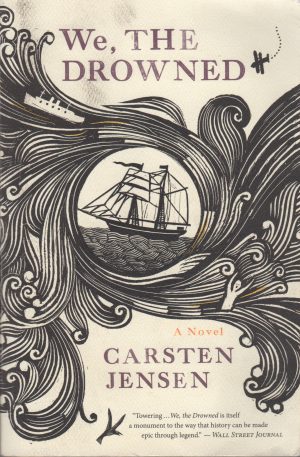
We, the Drowned by Carsten Jensen (2012. Mariner. ISBN 9780547737362)
Heralded by many as an “instant classic” when it was released in its original Danish, We, the Drowned is a worthwhile read. But. And here’s the caveat I would assert: it is not Denmark’s Anna Karenina or Grapes of Wrath or some such monumental work that defines a nation, a culture. No, We has more in common with Moby Dick, a novel many consider to be an American icon but one which, upon reading today, seems bogged down by page upon page of filler; fact interspersed with great narrative and descriptions of life at sea on a whaling ship tied to one mad man’s pursuit of infamy. Jensen’s prose, as translated, is honest, concise, and weightily dark, as one would expect from a Scandinavian author. And there are memorable characters crossing from one generation to another who drive the plot: a fictional history of the island of Marstal, a seafaring piece of land that harbored Danish sailing vessels, ships that sailed to every corner of the Earth in service of commerce.
As in every northern European novel, there are fantastic tales (Laurids, who is saved by his heavy boots as he ascends towards heaven on the business end of an explosion, is but one example of such a character), foreboding, death, pestilence, and evil. That’s one of the difficulties with this book: there is very little light or redemption or kindness or love expressed by any of the individuals who populate the tale. Sex isn’t romantic. Courtship isn’t kind or gentle or devoted. Cruelty and harshness abound. But the writing is succinct and direct, in a style that serves the story well. An example:
No one in our town has such a thing as privacy. There’s always an eye watching, an ear cocked. Each and every one of us generates a whole archive of talk. Your slightest offhand remark takes on the weight of a lengthy newspaper commentary. A furtive glance is instantly returned and pinned on its owner. We’re always coming up with new names for one another. A nickname’s a way of stating that no one belongs to himself…
Now, my wife will be the first to tell you that I love dark. Bleak could be my middle name. But 675 pages of small print of consistent, constant pain, suffering, and death tends, without some light, to be a bit much. Then too, the author’s choice of changing, without warning, from third person narrative (“they”) to first person (“we” or “I”), while perhaps valuable to the author’s intention of making the collective souls of Marstal a character in the story (the community having one, unified voice), was something I found disruptive to the story’s flow. And there’s the ending and the coincidences that align in the last one hundred pages of the tale that cut into the suspension of disbelief necessary in any work of fiction. I won’t ruin the book by revealing just what happens other than to say I was not enthralled with the ending. The book’s coda seemed far too predictable and pat. But then, perhaps professional envy is hurting my critical eye. After all, We has been translated across the globe whereas my two Finn novels, similar in genre to this work, remain largely undiscovered beyond the shores of my beloved Lake Superior. I hope the green eyed monster didn’t interfere with my reading of this novel. I enjoyed it. Just as not as much as predicted.
4 stars out of 5. Not The Old Man and the Sea but a solid read if you wish to learn more about Denmark and its nautical roots.
Peace.
Mark


